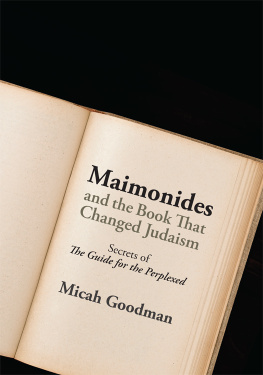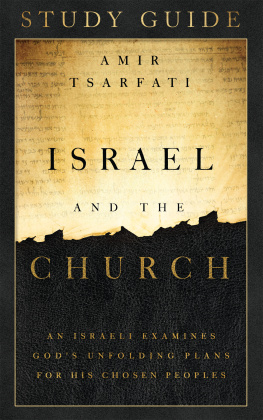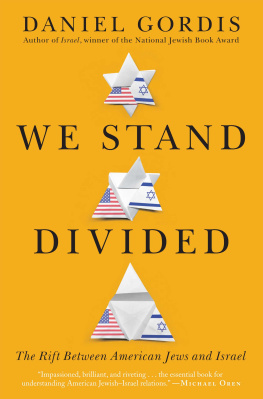Micah Goodman - The Wondering Jew: Israel and the Search for Jewish Identity
Here you can read online Micah Goodman - The Wondering Jew: Israel and the Search for Jewish Identity full text of the book (entire story) in english for free. Download pdf and epub, get meaning, cover and reviews about this ebook. year: 2020, publisher: Yale University Press, genre: Religion. Description of the work, (preface) as well as reviews are available. Best literature library LitArk.com created for fans of good reading and offers a wide selection of genres:
Romance novel
Science fiction
Adventure
Detective
Science
History
Home and family
Prose
Art
Politics
Computer
Non-fiction
Religion
Business
Children
Humor
Choose a favorite category and find really read worthwhile books. Enjoy immersion in the world of imagination, feel the emotions of the characters or learn something new for yourself, make an fascinating discovery.

- Book:The Wondering Jew: Israel and the Search for Jewish Identity
- Author:
- Publisher:Yale University Press
- Genre:
- Year:2020
- Rating:3 / 5
- Favourites:Add to favourites
- Your mark:
- 60
- 1
- 2
- 3
- 4
- 5
The Wondering Jew: Israel and the Search for Jewish Identity: summary, description and annotation
We offer to read an annotation, description, summary or preface (depends on what the author of the book "The Wondering Jew: Israel and the Search for Jewish Identity" wrote himself). If you haven't found the necessary information about the book — write in the comments, we will try to find it.
Micah Goodman: author's other books
Who wrote The Wondering Jew: Israel and the Search for Jewish Identity? Find out the surname, the name of the author of the book and a list of all author's works by series.
The Wondering Jew: Israel and the Search for Jewish Identity — read online for free the complete book (whole text) full work
Below is the text of the book, divided by pages. System saving the place of the last page read, allows you to conveniently read the book "The Wondering Jew: Israel and the Search for Jewish Identity" online for free, without having to search again every time where you left off. Put a bookmark, and you can go to the page where you finished reading at any time.
Font size:
Interval:
Bookmark:
THE WONDERING JEW
ISRAEL AND THE SEARCH FOR JEWISH IDENTITY
MICAH GOODMAN
TRANSLATED BY EYLON LEVY

Published with assistance from the Louis Stern Memorial Fund.
English translation copyright 2020 by Micah Goodman.
Originally published in 2019 in Hebrew as Chazara Bli Tshuva: Al Chiloniyut Acheret Veal Datiyut Acheret (The Philosophical Roots of the Secular-Religious Divide), copyright 2019 by Kinneret, Zmora, DvirPublishing House Ltd. Copyright 2019 by Beit Midrash Yisraeli.
All rights reserved.
This book may not be reproduced, in whole or in part, including illustrations, in any form (beyond that copying permitted by Sections 107 and 108 of the U.S. Copyright Law and except by reviewers for the public press), without written permission from the publishers.
Yale University Press books may be purchased in quantity for educational, business, or promotional use. For information, please e-mail sales.press@yale.edu (U.S. office) or sales@yaleup.co.uk (U.K. office).
Set in Meridien and Futura types by Tseng Information Systems, Inc., Durham, North Carolina.
Printed in the United States of America.
Library of Congress Control Number: 2020935677
ISBN 978-0-300-25224-8 (hardcover : alk. paper)
A catalogue record for this book is available from the British Library.
This paper meets the requirements of ANSI/NISO Z39.48-1992 (Permanence of Paper).
A Twenty-First-Century Dilemma
Many religious Jews offer arguments for why their faith represents the truth. They try to prove that God exists, that a revelation took place at Mount Sinai, and that the Torah is the word of God. At the same time, many secular Jews offer arguments for why their lack of faith represents the truth. They try to prove that God does not exist, that the revelation at Mount Sinai is a myth, and that the Torah is a fable. These opposing views represent a profound clash of ideasbut they are not the core of the argument tearing the Jewish people, and particularly Israeli-Jewish society, apart.
The argument stirring up the Jewish world is not over which side is right about God and revelation, but which belief offers a better, more empowering way forward. Does a religious life enrich our world or limit it? Does a secular life liberate us or limit us? This polemic will become clear in the two arguments with which I begin this book.
Let us try to be persuaded by them both.
In their most fanatical forms, religions cultivate intolerance, bigotry, and even violence. Human history is replete with catastrophes provoked by religious energies that became destructive. When taken to extremes, religion brings out the ugliest side of humankind. This is why critics of religion choose to assail it in its most radical guises. But we need not focus on religious extremism to find flaws in religion. Even less extreme versions of religion can harm their devotees. They might not sow destruction worldwide, but they can sow the seeds of self-destruction in the hearts of individual believers.
As a religion, Judaism nurtures in its adherents a sense of guilt. The halakha (Jewish religious law) consists of myriad detailed rules to which observant Jews are expected to adhere. It is a foregone conclusion that any Jew who aspires to obey faithfully every single halakhic law will fail, and this inevitable shortcoming causes many religious Jews distress. But Judaism not only instills feelings of guilt within its adherents; it also fosters judgmentalism toward others. Religious Jews tend to measure the worth of others by the level of their religious commitment. Guilt and judgmentalism, after all, are two sides of the same coin: guilt turns inward; judgmentalism, outward. Critics argue convincingly that this combination of guilt and judgmentalism limits religious Jews horizons and is emotionally damaging.
These are not the only disadvantages of the Jewish religious tradition. Judaism demands that its members make an even more painful sacrifice: their intellectual integrity. Religious Jews who are conscious of modern science and its findings, and are alert to the logical flaws at the heart of their religious faith, often feel that they must put their critical thinking aside whenever they enter a synagogue or beit midrash (religious study hall).
No wonder religion is subjected to such sharp criticism. If we agree that its extreme forms cultivate intolerance, bigotry, and violence, and its moderate forms foster guilt, judgmentalism, and uncritical thinking, then we will likely concur with the philosopher Yeshayahu Leibowitz that religion should be measured not by what it contributes to individuals but by what it deprives them of. Leibowitz was speaking specifically of the effort required to keep halakha, but more than exhausting adherents time and energies, religion seems to rob them of something of themselves. Religious Jews sacrifice aspects of their own personality for their faith.
Judaism demands an additional sacrifice. Orthodox Jews are often called on to surrender their humanistic values. Having grown up in modern societies and absorbed and internalized those societies values, they often experience a clash between the conscience that guides them and the tradition that binds them. And their values, which they feel compelled to live by, are silenced in favor of their religion, which they feel compelled to obey.
Consider three modern examples. The first and most prominent concerns the status and role of women in religious Jewish society. In the modern world, women can be prime ministers, chief justices, or CEOs of major corporations. Our world is one in which, in principle, all opportunities are open to women. But this world stops at the door of the synagogue. In Orthodox synagogues, for example, women are prohibited from leading the congregation in prayerin fact, they cannot even take part in the minyan (prayer quorum), which is open only to men. Effectively, they are denied full membership in their own congregation. This gulf between their modern and religious worlds sets up a cognitive dissonance for many observant Jews. What are they supposed to do? Must they stifle their moral instincts in the name of their religious obligations?
One further ideological clash that religious Jews have difficulty escaping concerns another form of exclusion. Many religious Jews believe that nobody should be excluded, insulted, or rejected because of his or her sexual orientation. The Torah, however, calls homosexual intercourse an abomination. How should Orthodox Jews resolve the conflict between their own moral sentiments and what appears to be an explicitly clear verse in the Torah?
Third, religious Jews who have internalized humanistic values take it almost for granted that all human beings share a basic equality. They find it jarring to think of one people or one nation standing above others. But this is exactly how Jewish tradition is conventionally understood. The Kuzari, by the medieval Spanish Jewish philosopher Judah Halevi, for example, states that just as human beings stand above animals, so Jews stand above other humans. How can Jews who believe in equality belong to a tradition that sanctifies hierarchies?
These three ideological conflicts illustrate the painful tension between modern values and ancient traditions. Religious Jews feel compelled to sacrifice their conscience for their faith. And this demand comes not from religious radicalism but from the traditional, mainstream form of the Jewish religion. Such beliefs neither threaten democracy nor endorse violence; they are not a source of physical harm or destruction. But they create violent conflicts within the psyches of believers, asking them to sacrifice aspects of their personalities, their intellectual integrity, and often also their humanistic values for their religious beliefs.
Next pageFont size:
Interval:
Bookmark:
Similar books «The Wondering Jew: Israel and the Search for Jewish Identity»
Look at similar books to The Wondering Jew: Israel and the Search for Jewish Identity. We have selected literature similar in name and meaning in the hope of providing readers with more options to find new, interesting, not yet read works.
Discussion, reviews of the book The Wondering Jew: Israel and the Search for Jewish Identity and just readers' own opinions. Leave your comments, write what you think about the work, its meaning or the main characters. Specify what exactly you liked and what you didn't like, and why you think so.



